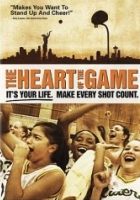 BUY IT AT AMAZON: CLICK HERE!
BUY IT AT AMAZON: CLICK HERE!
STUDIO: Miramax
MSRP: $29.99
RATED: PG-13
RUNNING TIME: 98 Minutes
SPECIAL FEATURES:
• Commentary by director Ward Serrill
• Deleted scenes with director commentary
• "The Making of The Heart of the Game"
• "Beyond The Heart of the Game"
The Pitch
Girls have hoop dreams too.
The Humans
Bill Resler, Darnellia Russell, Ludacris (Hustle & Flow), the Roosevelt High Roughriders
The Nutshell
This Ludacris-narrated documentary follows the many dramatic highs and lows experienced over 6 seasons by Seattle’s Roosevelt High’s girls’ basketball team, as unconventional new coach Bill Resler tries to lead them from the gutter to a state championship. Along the way he discovers a potential breakout star in troubled player Darnellia Russell, and together they face a series of social and legal hurdles.
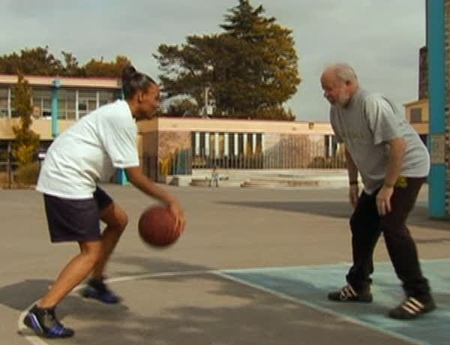
Schooling Forrester regrettably had to be abandoned after Sir Sean’s second coronary.
The Lowdown
I expected The Heart of the Game to be an arduous slog for several reasons. I have little to no interest in women’s sports outside the Olympics and tennis, simply because they rarely reach the intensity of the male equivalents. Beach volleyball is of course an exception to the rule.
I also couldn’t care less about high school sports, and am only a modest basketball fan. Furthermore I’ve seen one inspirational sports movie too many and feel burnt out on heartwarming pep talks and predictable last second heroics.
The first 20 minutes of the film confirmed my worst fears, crawling through a random collection of images and interviews outlining Resler’s first season that is only slightly more involving than those dreary local news human interest pieces I always run into when I want to know the forecast. Is there really an audience for some old coot droning on about how much the neighborhood’s changed since electricity was invented?
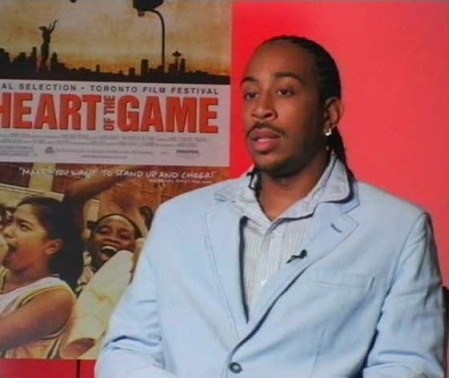
"If you’re watching Mr. Mann, I’m way down for 2 Miami 2 Vice."
Luckily once our heroine Darnellia joins the team the narrative becomes much more focused on Resler’s mission to take the Roughriders to the top, and a host of intriguing events ensues. One girl wins a college scholarship but drops out due to the lingering trauma of sexual abuse at the hands of her private trainer. A bitter feud over sharing the spotlight ferments between the team’s two top stars: the blue collar Darnellia and upper class Hillary. The team thunders into the state tournament several times only to fall apart inexplicably.
Every great struggle needs a menacing rival, and this is ably supplied by Roosevelt’s cross-town rival Garfield High, also historically an underachieving program. However they too recruit a new coach, former WNBA all-pro and Harlem Globetrotter Joyce Walker. The rivalry is personal for Darnellia, as Garfield is in her neighborhood and her best friend plays for their team.
Just as Darnellia and the Roughriders really start rolling, the unexpected knocks them off course. During a disappointing junior year tournament performance Darnellia discovers she’s pregnant and drops out of school. She returns a year later ready to play again, but finds a new obstacle in her way: the Washington State Athletics Association. They are determined to bar her from playing, apparently to penalize her for dropping out. Darnellia’s final season becomes a series of contests at two kinds of courts, trying to propel the team to the state championship on the one hand and earn the right to play there on the other.
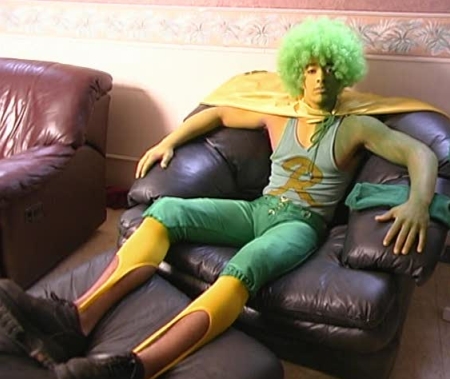
Never the most diligent of mascots, some games Riderman pumped up the fans via video conference.
Director Ward Serrill really stumbled onto a cinematic goldmine when he staked out this story. There are enough real life twists and turns and nail-biters in these 98 minutes to fill two or three of Hollywood’s assembly line fictional tales. This is especially evident on the court, where the Roughriders time after time face photo finishes as thrilling as anything I’ve seen in March Madness. Of course the Roughriders’ final opponent for the state championship turns out to be none other than Garfield. The pieces fall into place so perfectly one almost starts to suspect Serrill paid off a ref here and there.
Unquestionably the heart of the film is the relentless Resler, bent on taking his team to the top if it kills him. Like many Hollywood coaches, he is a harsh taskmaster on the court and a supportive friend off it, notably staying by Darnellia’s side all the way through her lengthy legal battle. The pre-game pep talks he gives the team are however far less conventional. Addressing his audience as if they were hardened Marines rather than teenage girls, Resler works himself up into a murderous rage and exhorts them to pretend they are wolves or tigers and spill their opponents’ blood. He doesn’t just want the other team beaten, he wants them dismembered and buried discreetly. Resler’s also quite entertaining off the court, a natural storyteller and not so natural musician.
The Heart of the Game provides a good overview of high school sports in general and the many challenges players face: meddlesome parents, studies, team chemistry, scholarship concerns, etc. In Darnellia’s sadly not too uncommon case there is also the gargantuan task of childrearing, though fortunately her family carries a good bit of the load.
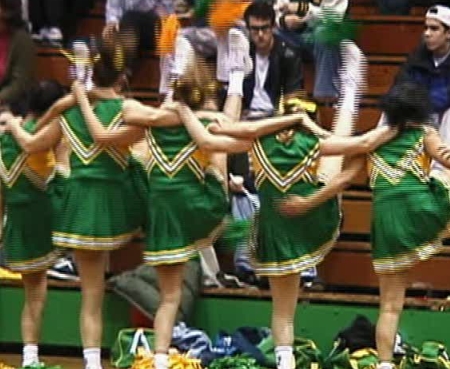
"Patrons in the front row are urged to wear the provided bibs to collect drool and incisors."
My only reservation about this film is that it spends far more time inside Resler’s head than any of the other principal characters. Clearly he was the most accessible, but it would have been interesting to hear more from the girls on key issues. For all the focus on Darnellia, we hear very little about what it’s like to be a young mother in high school or play on a nearly all-white and mostly wealthy team.
In particular one has to wonder whether Serrill didn’t drop the ball on the sexual abuse issue. A nighttime interview with that player is interrupted by a partially overheard, suspiciously personal phone call from her later to be convicted trainer. Naturally hindsight is 20/20, but you’d think Serrill might have wanted to suggest her parents keep an eye on that situation.
The Package
Although the design isn’t bad, the nearly colorless cover isn’t likely to attract much attention. Oddly Ludacris’ name isn’t featured.
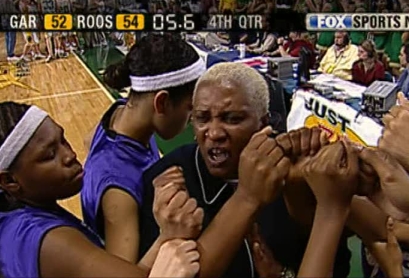
"I want you to rob, I want you to pillage, I want you to steal! This world will be ours! Are you with me?!"
The deleted scenes, with brief director’s commentary, are primarily lightweight and unnecessary, but you do get to see the full saga of the team’s charismatic goofball mascot Riderman.
Serrill, who looks not unlike Hank Azaria, comes across as a fairly interesting guy on the feature commentary, despite numerous pauses. It’s odd he didn’t recruit Resler to record with him, as he’s a funny guy and they demonstrate great chemistry in "The Making of the Heart of the Game." This entertaining chat between the two explores the many headaches involved in shooting one’s first documentary for extremely little money. Serrill typically had to act as cameraman while conducting interviews, and got the school band to compose new music for game scenes in order to avoid licensing fees. The crazy thing is he expected the film to be completed in one year, but interesting developments just kept popping up and pulling him back in.
Finally "Beyond the Heart of the Game" follows the film’s not terribly interesting publicity campaign, from media interviews to the Hollywood premiere. Author of such august lyrics as "I’m gonna make ’em dance so I can see them shake they ass, then I’ll put ’em in a trance till I get ’em out of them pants," Ludacris expresses grave concern over women’s self esteem problems.

Erik Estrada always rued the day his sister shacked up with Tim Conway.
I’ve seen Hoosiers, Coach Carter, and of course Teen Wolf, and The Heart of the Game handily outclasses all of them for high school basketball drama. It makes all the difference when every game is real, and holds the hopes and dreams of many in the balance. As opposed to Samuel L. Jackson’s paycheck.